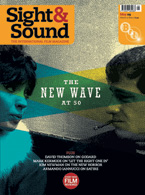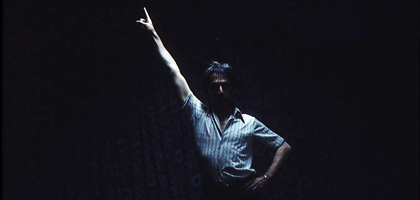
Staying alive
Tony Manero

A disturbing portrait of a Travolta-obsessed sociopath in Pinochet's Chile, Pablo Larraín's 'Tony Manero' is less about the dreams of the disco era than about the realities of life under dictatorship, says Jonathan Romney
Chilean director Pablo Larraín has remarked that his second feature Tony Manero can be seen as an allegory of life in his country under the Pinochet regime. Yet the film can also be taken as a more or less realistic evocation of life in Santiago in the late 1970s, depicting working-class Chileans who retreat from the realities of life under dictatorship into fantasies of other lives and other identities - or, in the case of the film's anti-hero, into narcissistic psychosis.
As played by Alfredo Castro, Raúl Peralta is one of the most disturbing and intractably unsympathetic figures in recent cinema. Both physically and in character, he is strikingly unlike the movie character he consciously emulates, John Travolta's disco dancer from Saturday Night Fever, and closer to Taxi Driver's deluded loner Travis Bickle. Raúl's dreams, however, are entirely self-serving, without the social-crusade fantasy that fuels Travis. (Facially, Raúl resembles Robert De Niro as little as he does Travolta - a scrofulous-looking Al Pacino would be nearer the mark.)
Among Raúl's kin in recent cinema, we might count such murderous outsiders as the reactionary butcher of Gaspar Noé's Seul contre tous, the religiously tormented chauffeur of Carlos Reygadas' Battle in Heaven and the serial killer in Jaime Rosales' The Hours of the Day, who fits his businesslike slaughter into the daily round of running a haberdashery. As for Raúl's political precursors, thriving under systems that benefit sociopathic opportunism, the foremost is surely Clerici in The Conformist - not least because, like Bertolucci's film, Tony Manero associates sexual dysfunction in the individual with political dysfunction in the state.
From the start, the film establishes the sense of a society in the throes of collective denial. Arriving at the TV studio too early, Raúl finds himself in a queue of Chuck Norris impersonators; the week after the Tony Manero contest, the programme will be looking for Chile's own Julio Iglesias. Larraín has commented that his film is not only about the 1970s but also stands as a commentary on Chile today, dominated by imported American fantasies. But it clearly has an even wider application, given the currently universal potency of the instant-celebrity dream promoted by reality-show culture.
What is most shocking in Tony Manero is the disjunction between the tawdriness of Raúl's dreams and the extremes to which he will go to achieve them. Even when he succeeds as Tony, coming second in the TV contest, he walks away with a desultory consolation prize; but then the happy winner too has to go home on the bus (trailed by a presumably homicidal Raúl).
Significantly, Larraín's film is about a dreamer playing a dreamer: the original Tony, in John Badham's 1977 film, was a working-class boy hoping to escape his drab existence (but at least he got to stay out at night, while Santiago's citizens are under curfew). The 'Tony' persona fills a hole in Raúl's damaged self, standing in for stable identity and social status. A total outsider, he has tenuous connections with the surrogate family of his dance troupe, but is always ready to betray them. He attempts sex with Pauli, the daughter of his girlfriend, then shits on the white suit belonging to her friend Goyo - arguably the film's most shocking act, because it's so primally infantile. Finally he abandons them all to interrogation by the police.
Raúl is all the more disturbing for his inscrutable lack of expressiveness: he recites Tony's English dialogue with robotic incomprehension, as if parroting a catechism. As a substitute for sexual release, he achieves a private ecstasy in his room, dancing alone on his mock-up of the famous illuminated glass floor at 2001 Odyssey in Saturday Night Fever.
The excesses of Pinochet's Chile find their reflection in Raúl's complementary disturbances, sexual and psychotic. His sexual identity is entirely narcissistic; while his girlfriend Cony complains about his impotence, Raúl's imagined sexual power, following the performance in the bar, convinces him that he can successfully fuck the young and (up to a point) willing Pauli. The result is a scene to rank among cinema's most excruciating depictions of bad sex: Raúl dry-humps the much younger woman, before she gives up on him for a frenzied bout of masturbation. (The implication is that she is frustrated by a lack of action from the feminine, possibly gay Goyo.)
Bizarrely, through his semi-successful appropriation of Travolta's persona, Raúl really does exert both sexual power and charisma, despite his obvious shortcomings both physically and as a dancer. Although Cony is horrified to see him slow-dancing with Pauli as a prelude to sex, neither she nor Goyo intervenes to stop them; soon afterwards, Cony is seen attending to Raúl in the bath, as solicitous as ever. Raúl has similar appeal for his ageing landlady Wilma, who makes advances to him.
Raúl's contradictory success in this respect might be seen as a parallel of General Pinochet's own feat in projecting himself as a national leader. One of the dictator's admirers is the elderly woman whom Raúl attacks (we can assume that all his assaults are fatal, although this is never made explicit). The suddenness of Raúl's violence here is unexplained, but is apparently triggered by the woman's approving comment that the General has blue eyes - suggesting a surge of impotent jealousy at an unchallengeable alpha male. Raúl later mercilessly suppresses the rival in his tribe, Goyo, by desecrating his fetishised suit - and what is the famous Travolta suit, after all, but a quasi-military uniform, the same sort of dazzling regalia that establishes Pinochet's authority?
In fact, Raúl is the only significant character who does not display evident political allegiances. Goyo is more or less undisguisedly on the left, a fact to which other characters make barbed allusions: his plea for unity in the dance troupe is attacked by Wilma, who sees it as smacking of communism. Displeased at Pauli's involvement with Goyo, Cony informs on her own daughter. Raúl, meanwhile, is entirely out for himself. Ostensibly apolitical, he is a true creature of totalitarianism; oppressive circumstances enable him to brutalise and exploit others with apparent impunity, his own crimes fading into the background in a society that is itself institutionally homicidal.
Larraín evokes place and period economically, creating a landscape of deserted streets, shuttered shop fronts and walls covered with whitewashed-over posters. Explicit references to the Pinochet regime are fleeting: the police and military are ominous background presences, and TV footage is used sparingly. Even given the period's stylistic absurdities, Raúl's discomania is never played for laughs or for cheap surrealism, notwithstanding such oddities as the TV show's diversely shaped handful of Travolta clones. Larraín and DoP Sergio Armstrong maintain a tone of claustrophobic realism through the use of grainy stock and muddy hues. The shooting style - to use a shorthand that has become virtually unavoidable - echoes the Dardenne brothers, with the camera hanging close on Raúl, capturing his nervy physical presence while his features remain impassive.
A leading Chilean stage actor and director associated with the work of such playwrights as Sarah Kane and Heiner Müller, Alfredo Castro perfectly catches the contradictions of Raúl's character. At once exhibitionist and undercover operator, his typical attitude, when not dancing, is furtive: Raúl is seen running through the streets or cagily ducking out of sight, either of imaginary pursuers or of real military patrols. The Saturday Night Fever song heard in the film is 'You Should Be Dancing', but we can imagine another Bee Gees number playing in Raúl's head: "You can tell by the way I use my walk…" Raúl is 'Stayin' Alive', but at everyone else's expense. And in a world such as Pinochet's, the film suggests, that is the way of things.
